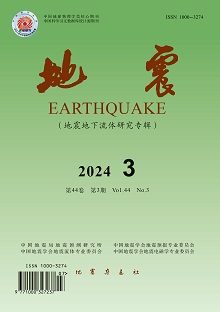对南大西洋斯科舍板块进行磁重研究,以确定海啸的特征
Q4 Earth and Planetary Sciences
引用次数: 0
摘要
南大西洋和南极洲斯科舍海地区的海洋和沿海环境很容易受到沿斯科舍弧地震活动的潜在灾难性影响。本文介绍了用于海啸特征描述的斯科舍板块磁重研究。利用 INTERMAGNET 网络观测站的数据研究了地震对地磁场(GMF)的影响。利用 NOAA 提供的重力数据和 Lamont-Doherty 地球观测站提供的地震折射数据,对构造模型进行了评估。研究还评估了对政府间海洋学委员会(IOC)验潮站测量的水位(WL)的影响。应用了交叉小波变换(XWT),并对 GMF 进行了频率分析,以确定地震事件期间的特定频率。利用重力测量和地震数据构建了北斯科舍海脊的二维构造模型,以确定地震事件期间可能被激活的构造边界的特征。对该地区 6 个验潮站收集的水位记录进行过滤和分析,以确定每个验潮站的海啸情况。结果表明,在 2013 年 11 月 25 日地震期间,全球移动加速度水平分量的频率分析中出现了异常频率,研究区域内不同观测站 0.5 和 1 小时周期的数据具有高度相关性。重力模型划定了在地震活动中被激活的断层,以及由于边缘的横流和压缩性质而可能被激活的结构边缘。研究地区的传播速度平均为 460 公里/小时,与这些深度的预期速度一致,但阿根廷港除外,超出预期速度 50%。本文章由计算机程序翻译,如有差异,请以英文原文为准。
Magnetogravimetric study on the Scotia Plate, in the South Atlantic Ocean for the characterization of tsunamis
The marine and coastal environments of the Scotia Sea regions in the Southern Atlantic Ocean and Antarctica are vulnerable to the potentially disastrous effects of seismic activity along the Scotia Arc. This paper presents a magnetogravimetric study of the Scotia Plate for tsunami characterization. The influence of earthquakes on the Geomagnetic Field (GMF) is investigated using data from INTERMAGNET network observatories. A tectonic model is evaluated using gravity data from NOAA and seismic refraction data from Lamont-Doherty Earth Observatory. The study also assesses the impact on water level (WL) measured at Intergovernmental Oceanographic Commission (IOC) tide gauge stations. Cross Wavelet Transform (XWT) is applied, and a frequency analysis of the GMF is conducted to identify specific frequencies during seismic events. A 2D tectonic model is constructed for the North Scotia Ridge using gravimetric and seismic data to characterize structural boundaries that may be activated during seismic events. Water level records collected from 6 tide gauge stations in the region are filtered and analyzed to identify tsunamis at each station. The results reveal anomalous frequencies in the frequency analysis of the horizontal component of the GMF during the November 25, 2013 earthquake, with high data correlation from different observatories in the study area for periods of 0.5 and 1 hour. Gravimetric modeling delineates faults activated during seismic activity and edges of structures potentially activated due to the transcurrent and compressional nature of the margin. WL anomalies up to 1.30 m are obtained following earthquakes with a magnitude greater than 8. The propagation speed in the study area averaged 460 km/h, consistent with the expected speed for those depths, except for Puerto Argentino, which exceeded them in 50%.
求助全文
通过发布文献求助,成功后即可免费获取论文全文。
去求助
来源期刊

地震
Earth and Planetary Sciences-Geophysics
CiteScore
0.60
自引率
0.00%
发文量
3214
期刊介绍:
Earthquake is a comprehensive academic journal hosted by the China Earthquake Network Centre (CENC) and edited by Mr. Wang Haitao, Director of CENC and a senior researcher. The purpose of the journal is to exchange research results on earthquake observation, earthquake precursors and strong earthquake mechanism and prediction, and to promote the exploration and research on earthquake forecasting and the application of its results in earthquake prevention and disaster reduction. The readers are mainly earthquake scientists and technicians engaged in the research of earthquake observation and analysis, earthquake precursor exploration, earthquake mechanism and prediction, as well as scientists and technicians in related scientific and technological fields.
Inclusion:
The Chinese core periodicals in the general list of the core periodicals
Chinese Science Citation Database (CSCD) Source Journals
Scopus (Netherlands) Source Journals
Japan Science and Technology Literature Database (JST) source journals
 求助内容:
求助内容: 应助结果提醒方式:
应助结果提醒方式:


